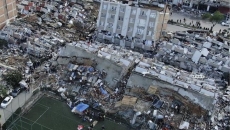WASHINGTON - Canada and the United States are eyeing the sky with suspicion these days — as well as the shared continental defence system that's supposed to be watching it for them.
The North American Aerospace Defence Command, or Norad, lost track of the mysterious object that was eventually shot down Sunday over Lake Huron, which some experts say offers proof positive that the system needs an overhaul.
"That alone, I think, bespeaks something of a collection, ingestion or analytic gap — or all three," said Jamil Jaffer, executive director of the National Security Institute at George Mason University in Northern Virginia.
"As a result, Norad modernization has to be in play, as do the overall collection and identification capabilities of the collective U.S. and Canadian defences."
Three separate objects were blown out of the sky in as many days over the weekend, a flurry of close encounters that followed what U.S. officials say was a Chinese surveillance balloon that floated across the continent two weeks ago.
U.S. and Canadian recovery teams are battling difficult terrain and harsh conditions to retrieve whatever debris remains at three separate locations: the frozen Arctic Ocean, a remote stretch of Yukon and the depths of the Great Lakes.
Military officials believe that the object downed over Lake Huron was first detected Saturday above southern Alberta before radar operators lost contact somewhere over Montana. They picked up a fresh signal as the object neared Wisconsin.
All of the evidence points to a new challenge that neither country, whether separately or working together, is adequately equipped to confront, Jaffer said.
"There's almost no question in my mind that we're going to need to develop new capabilities — and whether those capabilities are to deal with an old threat or a less modern threat or a more modern threat, it's hard to know," he said.
"There's no doubt that we need to really do a retrospective and figure out what's going on here. But our systems aren't oriented — at least it appears — towards balloons and potentially drones or whatever these other vehicles are."
For years, Canada and the U.S. have been publicly talking about and privately working on upgrading Norad, which military commanders and lawmakers on both sides of the border have long acknowledged is a badly outdated system.
It was top of mind Friday in D.C., when Defence Minister Anita Anand and U.S. Defense Secretary Lloyd Austin met in person at the Pentagon — the same day U.S. fighter jets engaged a flying object off the north Alaska coast.
But neither Austin nor Anand have said much about how those efforts are going, when they might be complete or whether a more modern Norad would be better equipped to detect unmanned, slow-moving, high-altitude interlopers.
In a recent interview prior to the latest encounters, Royal Canadian Air Force commander Lt.-Gen. Eric Kenny referred questions about the suspected Chinese spy balloon to Norad.
However, he was able to offer some fidelity on the plan to modernize Norad, suggesting military officers on both sides of the border are quietly plugging away on a number of fronts to modernize and improve the continent's defences.
The plan for Canada includes two different types of long-range radar systems — one in Southern Canada that can detect airborne threats coming from the direction of Greenland and northern Europe, the other in the High Arctic to monitor the entire polar region.
The 1980s-era string of radars known as the North Warning System, the backbone of the current Norad system, will be modernized, he added, while military-owned satellites are on the books for added surveillance as well as Arctic communication.
"We're doing our best to move them as quickly as possible," Kenny said. "In fact, I'm building up a more robust team here in our headquarters to move these projects along."
The majority, however, aren't likely to be up and running until later this decade, and not until the mid-2030s for the satellites.
Kenny said his top priority is the southern radar system, known as Arctic over-the-horizon radar, but the Defence Department says exact timelines and even a location have yet to be confirmed.
The object shot down over Yukon appeared to be a "small, metallic balloon" with a tethered payload that ventured near "sensitive sites" in the U.S., CNN reported Monday, based on a Pentagon memo sent to members of Congress.
That same memo said the Lake Huron object "slowly descended" into the water after it was shot down, the report said.
A Canadian Coast Guard vessel was dispatched Monday to assist in the Lake Huron search, along with a drone team and RCMP investigators. Canadian Armed Forces personnel are also engaged in the search in Yukon, where weather conditions and difficult terrain are posing challenges.
The Royal Canadian Air Force has deployed a CC-130H Hercules, two CC-138 Twin Otters, a CH-148 Cyclone, and a CH-149 Cormorant aircraft to support efforts to recover the debris over what officials described as a 3,000-square-kilometre area.
"It is unfortunately very rugged and mountainous terrain," said Sean McGillis, executive director of federal policing strategic management at the RCMP, which is leading the two searches.
"The weather conditions are not great … There's a very high level of snowpack in the region. So, our efforts are going to be difficult, they will be challenging, they will take us some time."






